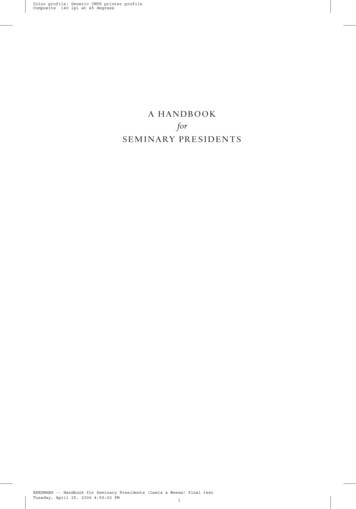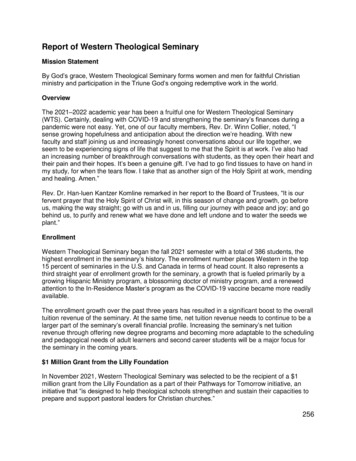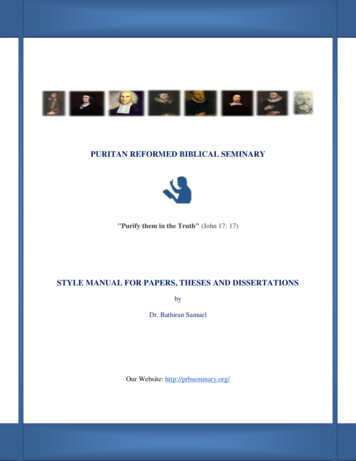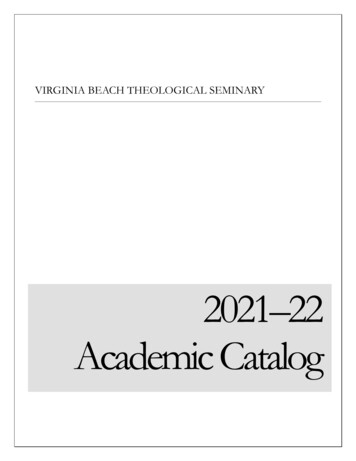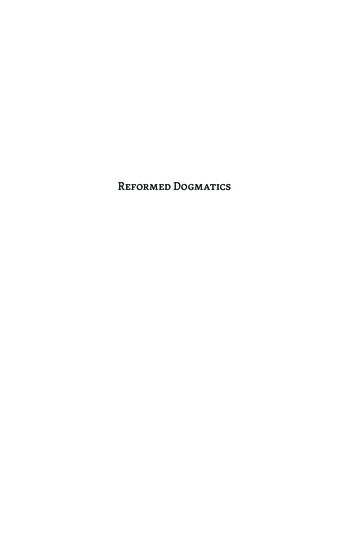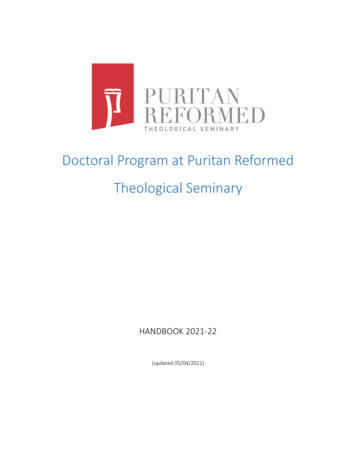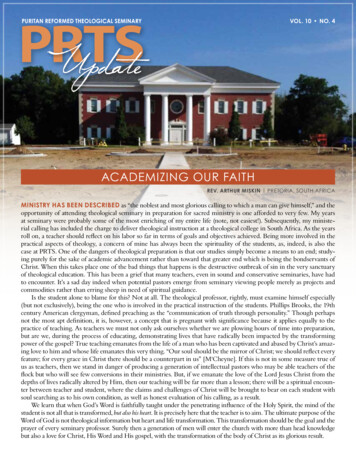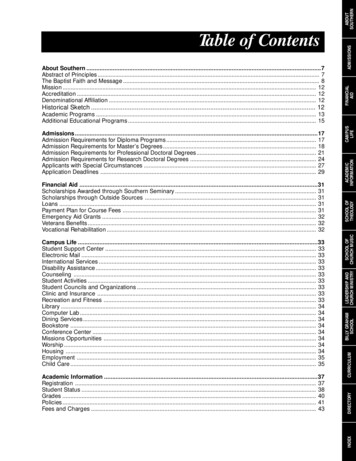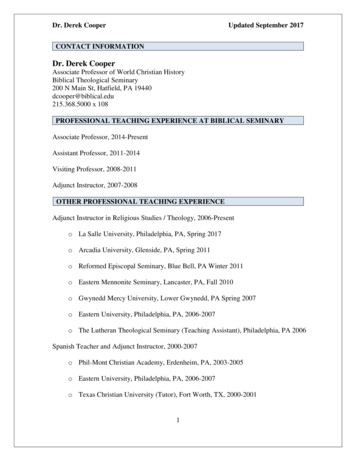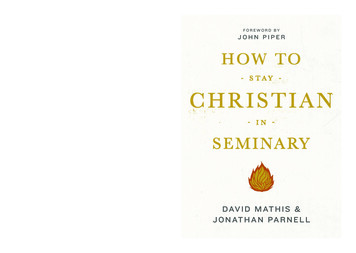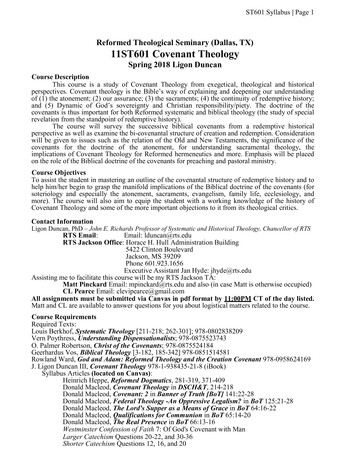
Transcription
ST601 Syllabus Page 1Reformed Theological Seminary (Dallas, TX)11ST601 Covenant TheologySpring 2018 Ligon DuncanCourse DescriptionThis course is a study of Covenant Theology from exegetical, theological and historicalperspectives. Covenant theology is the Bible’s way of explaining and deepening our understandingof (1) the atonement; (2) our assurance; (3) the sacraments; (4) the continuity of redemptive history;and (5) Dynamic of God’s sovereignty and Christian responsibility/piety. The doctrine of thecovenants is thus important for both Reformed systematic and biblical theology (the study of specialrevelation from the standpoint of redemptive history).The course will survey the successive biblical covenants from a redemptive historicalperspective as well as examine the bi-covenantal structure of creation and redemption. Considerationwill be given to issues such as the relation of the Old and New Testaments, the significance of thecovenants for the doctrine of the atonement, for understanding sacramental theology, theimplications of Covenant Theology for Reformed hermeneutics and more. Emphasis will be placedon the role of the Biblical doctrine of the covenants for preaching and pastoral ministry.Course ObjectivesTo assist the student in mastering an outline of the covenantal structure of redemptive history and tohelp him/her begin to grasp the manifold implications of the Biblical doctrine of the covenants (forsoteriology and especially the atonement, sacraments, evangelism, family life, ecclesiology, andmore). The course will also aim to equip the student with a working knowledge of the history ofCovenant Theology and some of the more important objections to it from its theological critics.Contact InformationLigon Duncan, PhD – John E. Richards Professor of Systematic and Historical Theology, Chancellor of RTSRTS Email:Email: lduncan@rts.eduRTS Jackson Office: Horace H. Hull Administration Building5422 Clinton BoulevardJackson, MS 39209Phone 601.923.1656Executive Assistant Jan Hyde: jhyde@rts.eduAssisting me to facilitate this course will be my RTS Jackson TA:Matt Pinckard Email: mpinckard@rts.edu and also (in case Matt is otherwise occupied)CL Pearce Email: clevipearce@gmail.comAll assignments must be submitted via Canvas in pdf format by 11:00PM CT of the day listed.Matt and CL are available to answer questions for you about logistical matters related to the course.Course RequirementsRequired Texts:Louis Berkhof, Systematic Theology [211-218; 262-301]; 978-0802838209Vern Poythress, Understanding Dispensationalists; 978-0875523743O. Palmer Robertson, Christ of the Covenants; 978-0875524184Geerhardus Vos, Biblical Theology [3-182, 185-342] 978-0851514581Rowland Ward, God and Adam: Reformed Theology and the Creation Covenant 978-0958624169J. Ligon Duncan III, Covenant Theology 978-1-938435-21-8 (iBook)Syllabus Articles (located on Canvas):Heinrich Heppe, Reformed Dogmatics, 281-319, 371-409Donald Macleod, Covenant Theology in DSCH&T, 214-218Donald Macleod, Covenant: 2 in Banner of Truth [BoT] 141:22-28Donald Macleod, Federal Theology -An Oppressive Legalism? in BoT 125:21-28Donald Macleod, The Lord's Supper as a Means of Grace in BoT 64:16-22Donald Macleod, Qualifications for Communion in BoT 65:14-20Donald Macleod, The Real Presence in BoT 66:13-16Westminster Confession of Faith 7: Of God's Covenant with ManLarger Catechism Questions 20-22, and 30-36Shorter Catechism Questions 12, 16, and 20
ST601 Syllabus Page 2Online LecturesThere will be online lectures to which the student will be required to listen and take notesbefore class. These are located on iTunes gy-dr.-j.-ligon/id668706261).Class AttendanceGiven the huge amount of material we have to cover and the relative scarcity of classroom hours,attendance will be at a premium and, of course, to the benefit of the student. Roll will be taken atevery class. If you need to miss a class or to leave early or to arrive late, you should seek permission(via my TA, my EA, or myself). Failure to attend class, or to engage while in the class, will be noted.No unexplained absences.Academic IntegrityAll work submitted must be the student’s own. Group-produced work is not permitted. Plagiarismand copying of old assignments are all considered cheating. Students who do not fulfill assignmentswith requisite academic integrity will be referred to the Academic Dean with a recommendation fordiscipline (the student should also consult pp. 33-34 in the Handbook for further details).Technology UseLaptop computers may not be used during this course. Students desiring to use a laptop for notetaking purposes only may request an application for permission to do so.Course Evaluation1. Reading and Course Notebook (20%) Each student will keep a course notebook to reflect hisstudies in the course as well as provide the basis for future study or teaching opportunities. Pleasesee the directions below for completing this assignment.2. Doctrinal Précis' (15%) See the last page for details.3. Quizzes (15%) The Student should prepare for and expect a quiz over the reading that is due onthat day. These quizzes will be taken through the Canvas website. You may not use any helps suchas, but not limited to, notes, textbooks, books, Bible, etc.4. Final Examination (50%) The Exam will cover reading and lecture material from the whole ofthe course. Further details will be given.Late WorkStudents should make every effort to turn in work on time or early. In the rare case of medical orother providential emergency, extensions and/or alternative arrangements may be granted. In mostcases, late assignments will be accepted but penalized one letter grade per day. Please make thesearrangements with the TA as soon as possible.
ST601 Syllabus Page 3Instructions for Course NotebookThe notebook assignment is designed to reward students for their labors in engaging in theclassroom and in assigned reading, and to provide them with a study guide for the final exam—aswell as a permanent reference resource for studying and teaching Covenant Theology in the future.1. Classnotes Assignment:Inclusion of the student’s classnotes in the course notebook will enable the instructor to gauge thequality of classroom listening and comprehension, and notetaking (and make adjustments in deliveryor content beneficial for students).2. Reading Notes Assignment:Please include your notes taken (typed or neatly scripted) on reading of Berkhof, Poythress,Macleod, and Heppe.3. Westminster Confession of Faith (WCF) Outline Assignment:This project calls for the student to develop a robust, typed, outline of the assigned chapter of theWCF (chapter 7). Aim for around 1 page, and include material like Scripture proofs.4. Ward SynopsisThe student will produce a one-page synopsis of Rowland Ward’s God and Adam. The synopsisshould be in outline form or in abbreviated narrative, should aim to enumerate the key points in eachsection, and should be as compact and lucid as possible. The goal of the synopsis is for the student toaccurately reproduce the flow of the book’s argument and its main thrust and points. The synopsisshould begin with a paragraph-length statement of the book’s thesis and conclusion. Then, an outlineof the assigned contents should follow. The student may also want to create a list of the best quotes,and points of weakness or disagreement.Due Dates SummaryMarch 3 Précis on Covenant of WorksMarch 24 Précis on Covenant of GraceApril 7Précis of Covenant TheologyApril 21 Précis on Covenant of RedemptionApril 28 Course Binder dueCollection of AssignmentsAll assignments are due by 11:00 PM CT of the assigned day. Assignments received after this timewill be considered late and penalized accordingly. Assignments are not to be emailed to the TA, butrather uploaded to the corresponding Canvas module.Teaching Schedule: Meets Monday, February 19 – Friday, February 23, 2018February 19 (AM)Introduction to Covenant TheologySyllabus/Reading/Assignment ReviewWhat is Covenant Theology? What is a Covenant? Why study it?Covenant Theology (History and Objections)February 19 (PM)February 20 (AM)February 20 (PM)February 21 (AM)February 21 (PM)February 22 (AM)February 22 (PM)February 23Covenant of Works (or Creation)Covenant of Grace (Adam)Covenant of Grace (Noah)Covenant of Grace (Abraham)Covenant of Grace (Moses)Covenant of Grace (David)DispensationalismCovenant of Grace (Jeremiah-New)
ST601 Syllabus Page 4Course Outline and Assignment ScheduleListed below are the dates and topics and weekly assignment timetable/due dates for our course.Please factor these into to your term calendar now!February 19 AMFebruary 19 PMFebruary 20 AMFebruary 20 PMFebruary 21 AMFebruary 21 PMFebruary 22 AMFebruary 22 PMFebruary 23[CLASS 1] Introduction to Covenant TheologySyllabus/Reading/Assignment ReviewWhat is Covenant Theology? What is a Covenant? Why study it?Covenant Theology (History and Objections)[CLASS 1] Covenant of Works (or Creation)[CLASS 2] Covenant of Grace (Adam)[CLASS 2] Covenant of Grace (Noah)[CLASS 3] Covenant of Grace (Abraham)[CLASS 3] Covenant of Grace (Moses)[CLASS 4] Covenant of Grace (David)[CLASS 4] Dispensationalism[CLASS 5] Covenant of Grace (Jeremiah-New)February 24DUE: Louis Berkhof, Systematic Theology, 211-218DUE: Donald Macleod, Covenant Theology.DUE: O. Palmer Robertson, Christ of the Covenants, 3-63.DUE: J. Ligon Duncan III, Covenant Theology, Chapter 1.DUE: Listen to online lectures – Lesson 1DUE: WCF 7; LC Questions 20-22, 30-36; and SC Questions 12,16, & 20.DUE: Quiz #1March 3DUE: O. Palmer Robertson, Christ of the Covenants, 67-87.DUE: Donald Macleod, Covenant: 2 & Federal Theology-An OppressiveLegalism?DUE: Heinrich Heppe, Reformed Dogmatics, 281-319.DUE: Ward, God and Adam, 1-27.DUE: J. Ligon Duncan III, Covenant Theology, Chapter 2.DUE: Listen to online lectures – Lesson 2DUE: Quiz #2**All students submit précis on Covenant of Works.March 10DUE: O. Palmer Robertson, Christ of the Covenants, 91-107.DUE: Louis Berkhof, Systematic Theology [262-301].DUE: Heinrich Heppe, Reformed Dogmatics [371-409]DUE: Ward, God and Adam, 28-76.DUE: Quiz #3March 17SRING BREAK! No assignments due.March 24DUE: O. Palmer Robertson, Christ of the Covenants, 109-125.DUE: Ward, God and Adam, 77-125.DUE: J. Ligon Duncan III, Covenant Theology, Chapter 3.DUE: Listen to online lectures – Lesson 3DUE: Quiz #4**All students submit précis on Covenant of Grace.March 31DUE: O. Palmer Robertson, Christ of the Covenants, 127-166.DUE: Donald Macleod, The Lord's Supper as a Means of Grace (all),Qualifications for Communion (all), and The Real Presence (all).DUE: Ward, God and Adam, 126-197.DUE: J. Ligon Duncan III, Covenant Theology, Chapter 4.DUE: Listen to online lectures – Lesson 4DUE: Quiz #5
ST601 Syllabus Page 5April 7DUE: O. Palmer Robertson, Christ of the Covenants, 167-199.DUE: Quiz #6**All students submit précis on Covenant Theology(Definition, Description, Distinctives, and History).April 14DUE: O. Palmer Robertson, Christ of the Covenants, 201-269.DUE: Vern Poythress, Understanding Dispensationalists (all).DUE: J. Ligon Duncan III, Covenant Theology, Chapter 5.DUE: Listen to online lectures – Lesson 5DUE: Quiz #7April 21DUE: O. Palmer Robertson, Christ of the Covenants, 271-300.DUE: Vos, Biblical Theology, 3-182.DUE: J. Ligon Duncan III, Covenant Theology, Chapter 6-7.DUE: Listen to online lectures – Lessons 6-7.DUE: Quiz #8**All students submit précis on Covenant of Redemption.April 28DUE: Vos, Biblical Theology, 185-342.DUE: J. Ligon Duncan III, Covenant Theology, Chapter 8-9DUE: Listen to online lectures – Lessons 8-9DUE: Quiz #9DUE: Course Notebook and Revised Précis**All students submit Course NotebookFinal Exam TBDAbout the TeacherFor inquiring minds who want to know, I taught full-time at RTS from June 1990- July 1996 andthen became the Minister of the historic First Presbyterian Church (1837), Jackson, Mississippi inAugust of 1996. In 2013, I was called to serve as the Chancellor and CEO of Reformed TheologicalSeminary. At the beginning of 2014, I assumed that role fully as I transitioned from full-timeministry at First Presbyterian Church over to full-time leadership at RTS.I am a native of Greenville, South Carolina, and was born and reared in a Christian home (a ninthgeneration Southern Presbyterian to be precise!). I am a graduate of Furman University, Greenville,SC (BA); Covenant Theological Seminary, St. Louis (MDiv, MA); and the University of Edinburgh,Scotland (PhD). I have been here in Jackson for over 25 years now.My wife, Anne (who is a graduate of Furman University, BA; Gordon-Conwell Seminary, MRE;and Reformed Theological Seminary, MA [MFT]) is an accomplished Christian Educator in her ownright, and is the loving mother of our daughter, Sarah Kennedy, and son, Jennings.
ST601 Syllabus Page 6Précis AssignmentsA précis is a precise summary or abstract of a particular subject matter or topic. Each student mustcomplete four, one-page précis' of 4 assigned topics: Covenant Theology (Definition, Description,Distinctives, and History); Covenant of Redemption; Covenant of Works; Covenant of Grace. Thesewill aid you in understanding more about the doctrine as well as provide you with teaching materialfor the future. Please see the TA if you have any questions, uncertainties, or difficulties. These mustbe submitted in pdf format on Canvas. Each précis must be exactly one page with the bibliographyon the second page. The format will be 11 pt., Times New Roman, ½” margins, single spaced. Youmust use MLA parenthetical citations such as [“by means of the covenant” (Marcel 127).] Followingis an example of how your paper should be titled:mePrécis on the Covenant of Works3/9/2017Begin by outlining the doctrine. For example, you may break the Covenant of Works down toContracting Parties, Abiding Significance, Sacraments, Blessings & Curses, Ordinances, Christ’sFulfillment, and Stipulations. Then fill it in with Scripture references and supportingquotations/summaries from your research maintaining the outline format. Following are twoexamples of précis: one is sparse, the other is full. One is in proper format, the other is not.BadGoodSuggested Resources:Berkhof, Louis, and Louis Berkhof. Systematic Theology. Grand Rapids, MI: W.B. Eerdmans Pub., 1996.Hodge, Archibald Alexander. Outlines of Theology. Edinburgh: Banner of Truth Trust, 1983.Reymond, Robert L. A New Systematic Theology of the Christian Faith. Nashville: T. Nelson, 1998.The Westminster Confession of Faith: With Proof Texts. Horsham, PA: Great Commission Pub., 1992.
ST601 Syllabus Page 7Course Objectives Related to MDiv Student Learning OutcomesWith Mini-JustificationCourse: 11ST601 Covenant TheologyCampus: DallasProfessor: Rev. Dr. J. Ligon Duncan IIIDate: Spring 2018RubricDMin Student Learning OutcomesØØØØArticulation(oral &written)Broadly understands and articulates knowledge, both oraland written, of essential biblical, theological, historical,and cultural/global information, including details,concepts, and frameworks.ScriptureSignificant knowledge of the original meaning ofStrongScripture. Also, the concepts for and skill to researchfurther into the original meaning of Scripture and toapply Scripture to a variety of modern circumstances.(Includes appropriate use of original languages andhermeneutics; and integrates theological, historical, andcultural/globalperspectives.)Significant knowledge of Reformed theology and practice, Strongwith emphasis on the Westminster Standards.ReformedTheologySanctification Demonstrates a love for the Triune God that aids theStrongModeratestudent’s sanctification.Desire forWorldviewBurning desire to conform all of life to the Word of God.ModerateWinsomelyReformed/EvangelisticEmbraces a winsomely Reformed ethos. (Includes anappropriate ecumenical spirit with other Christians,especially Evangelicals; a concern to present the Gospelin a God-honoring manner to non-Christians; and a truthinlove attitude in disagreements.)Ability to preach and teach the meaning of Scriptureto both heart and mind with clarity and enthusiasm.StrongPreachWorshipKnowledgeable of historic and modern Christian-worshipforms; and ability to construct and skill to lead a worshipservice.Ability to shepherd the local congregation: aiding inShepherdspiritual maturity; promoting use of gifts and callings;and encouraging a concern for non-Christians, both inAmericaand worldwide.Church/World Ability to interact within a denominational context,within the broader worldwide church, and withsignificant public StrongModerateThe student will have a firm grasp of thefundamentals of Covenant theology as it spans andintegrates the Scripture; the student will articulatehis knowledge on the cumulative, comprehensivefinal exam as well as on four précis assignments.The student will be able to understand how Godhas dealt with man in terms of covenantsthroughout all of history.Covenant Theology is an important concept toReformed Theology; without a firm foundation andintroduction to the Covenants, the student will beunable to grasp the Westminster Standards.The student will glorify the God who freely boundHimself save dead sinners by means of theCovenant of Grace.The student will be able to articulate a world andlife view in which the Covenant of Grace is freelyoffered to all men as the one means of salvationfrom the wrath to come.The student will understand the distinctiveness andnecessity of Covenant Theology as well as arespectful engagement of alternatives such asDispensationalism.The student will find that a Scripture united bycovenants provides fertile ground for harvestingpreaching texts, topics, and applications.This course will aid the worshiper to better knowthe God who commands us to worship Himaccording to His word.ModerateBy studying the theology taught in God’s Word, theman of God is equipped to better use his gifts andcallings, to encourage, reprove, rebuke, and exhortwith complete patience and teaching.ModerateWhile ecclesiology is covered a different course,proper theology is essential for good and rightdoxology, both to understand how to love one’sneighbor as well as love one’s brethren.
This course is a study of Covenant Theology from exegetical, theological and historical perspectives. Covenant theology is the Bible's way of explaining and deepening our understanding of (1) the atonement; (2) our assurance; (3) the sacraments; (4) the continuity of redemptive history; and (5) Dynamic of God's sovereignty and Christian .
